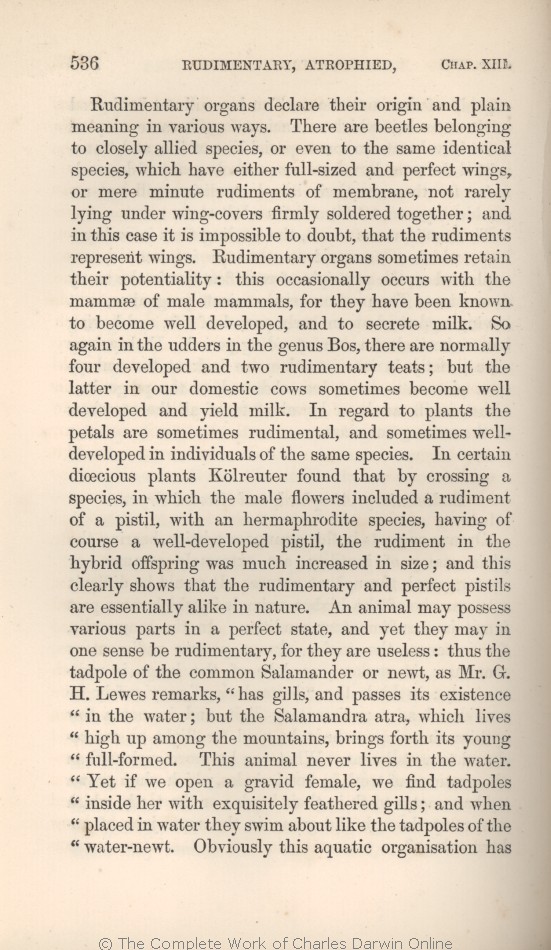Rudimentary organs
declare their origin and plain | declare their origin and plain 1869 |
| plainly declare their origin and 1872 |
| OMIT 1869 1872 |
| The meaning of rudimentary organs is often quite unmistakeable: for instance 1859 1860 1861 |
| The meaning of rudimentary organs is often quite unmistakeable: for instance, 1866 |
| There 1869 1872 | | there 1859 1860 1861 1866 |
| belonging to closely allied species, or even to 1869 1872 |
| of 1859 1860 1861 1866 |
| identical species, which have either full-sized and perfect wings, or mere minute 1869 |
| genus (and even of the same species) resembling each other most closely in all respects, one of which will have full-sized wings, and another mere 1859 1860 1861 1866 |
| identical species, which have either full-sized and perfect wings, or mere 1872 |
| membrane, 1869 1872 | | membrane; 1859 1860 1861 1866 |
| not rarely lying under wing-covers firmly soldered together; and in this case 1869 |
| and here 1859 1860 1861 1866 |
| which not rarely lie under wing-covers firmly soldered together; and in these cases 1872 |
| potentiality: 1869 1872 | | potentiality, 1859 1860 1861 1866 |
| this occasionally occurs 1869 1872 |
| and are merely not developed: this seems to be the case 1859 1860 1861 1866 |
| for they have been known to 1869 |
| for many instances are on record of these organs having 1859 1860 1861 1866 |
| which have been known to 1872 |
| developed, 1869 | | developed 1859 1860 1861 1866 1872 |
| and to 1869 1872 |
| in full-grown males, and having 1859 1860 1861 1866 |
| secrete 1869 1872 | | secreted 1859 1860 1861 1866 |
| OMIT 1869 1872 |
| there are normally four developed and two rudimentary teats 1859 1860 1861 1866 |
| in 1869 1872 | | of 1859 1860 1861 1866 |
| Bos, 1859 1860 1869 1872 | | Bos; 1861 1866 |
| there are normally four 1869 1872 |
| but in our domestic cows the two sometimes become 1859 1860 1861 1866 |
| two rudimentary teats; but the latter in our domestic cows sometimes become well developed and yield 1869 1872 |
| give 1859 1860 1861 1866 |
| regard to plants 1869 1872 |
| individual plants of the same species 1859 |
| plants of the same species 1860 1861 1866 |
| are sometimes 1869 1872 |
| sometimes occur as mere 1859 1860 1861 1866 |
| rudimental, 1869 | | rudiments, 1859 1860 1861 1866 | | rudimentary, 1872 |
| well-developed in individuals of the same species. 1869 |
| in a well-developed state. 1859 1860 1861 1866 |
| well-developed in the individuals of the same species. 1872 |
| certain diœcious plants Kölreuter found that by crossing a species, in which 1869 |
| plants with separated sexes, 1859 1860 1861 |
| some plants with their sexes separated, 1866 |
| certain plants having separated sexes 1872 |
| the male flowers included a rudiment of a pistil, with an hermaphrodite species, having of course a well-developed pistil, the rudiment 1869 |
| the male flowers often have a rudiment of a pistil; and Kölreuter found that by crossing such male plants with an hermaphrodite species, the rudiment of the pistil 1859 1860 1861 |
| the male flowers include a rudiment of a pistil; and Kölreuter found that by crossing a species of this kind with another hermaphrodite species, the rudiment of the pistil 1866 |
| Kölreuter found that by crossing a species, in which the male flowers included a rudiment of a pistil, 1872 |
| in 1859 1860 1861 1866 1869 |
| with an hermaphrodite species, having of course a well-developed pistil, the rudiment in 1872 |
| clearly shows that 1869 1872 |
| shows that 1859 1860 1861 |
| clearly shows how essen- tially alike in nature 1866 |
| rudimentary 1869 1872 | | rudiment 1859 1860 1861 1866 |
| ..... 1869 1872 | | the 1859 1860 1861 1866 |
| pistils 1869 1872 | | pistil 1859 1860 1861 1866 |
| are 1859 1860 1861 1869 1872 | | are. 1866 |
| essentially 1859 1860 1861 1869 1872 | essentially 1866 |
| alike 1859 1860 1861 1869 1872 | alike 1866 |
| in 1859 1860 1861 1869 1872 | in 1866 |
| nature. 1859 1860 1861 1869 1872 | nature. 1866 |
| newt, 1869 | | Water-newt, 1872 |
| "full-formed. 1869 | | full-formed. 1872 |
| "water-newt. 1869 | | water-newt. 1872 |
|









